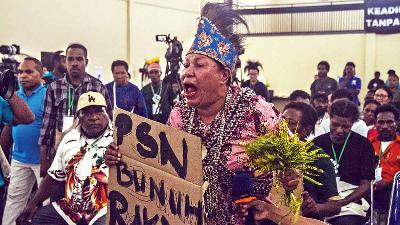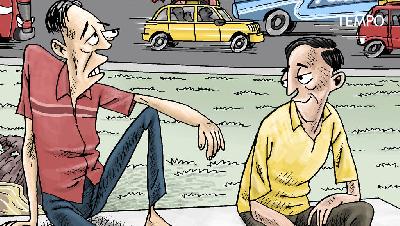The Half-hearted Battle Against Online Gambling
Monday, April 7, 2025
The government has never been serious about eradicating online gambling. There are many ways to go after the gambling bosses.
arsip tempo : 174495671450.

AS in many other criminal cases, the police do not appear to be serious about eradicating online gambling. Only the small-scale gamblers and bookies are targeted, while the major players in this illicit business are never touched, let alone the politicians and generals who protect them.
The police have long claimed that it is difficult to stop online gambling because the servers hosting them are not in Indonesia, but in countries where gambling is legal. This excuse, if it is not a reflection of laziness on the part of the authorities, is an indication that they are getting benefits from this illegal business.
Rumors that officers receive money from gambling bosses are nothing new. At the time of the murder of Insp. Gen. Ferdy Sambo’s adjutant, rumors emerged about the management of ‘Consortium 303.’ The number 303 refers to the article in the Criminal Code on gambling.
Sambo was entrusted with collected payments from gambling tycoons for various purposes. The rumors that these payments from online gambling were used for various activities to bring about a victory in the 2024 general elections must be investigated.
The Indonesian National Police should not let investigations peter out. The initial fanfare about stopping online gambling and going after those backing it has faded away as the Sambo case fades into memory.
Our investigation in Sihanoukville and Poipet, two gambling centers in Cambodia, discovered that a number of casinos there are run by Indonesian business people. Some of them have long been known as owners of gambling businesses. Crossing state borders, online gambling affiliated with these casinos targets players in Indonesia. And many of the people working there are brought from Indonesia.
The reluctance of the police is apparent from the lackluster way they respond to reports from the public. Every time somebody files a report, the police demand evidence. However, the initial indications submitted by the public—including coverage in the media—could be used as clues. This magazine discovered documentation relating to the ownership of a gambling business in Cambodia that clearly mentioned the names of the managers, including business people whose names had long been mentioned.
Circumventing the law by conducting gambling operations overseas, these bosses could still be pursued. The flows of funds could still be traced, despite the layers of concealment. Another strategy would be to investigate the human trafficking in relation to the recruitment of casino staff.
Online gambling could also be stopped by blocking access of the managers to the Internet. The government has the Ministry of Communications and Digital Affairs, which could prevent gambling sites from being accessed by the public.
But the blocking by the Communication and Digital Affairs Ministry has not been done seriously, as shown by the detention of more than 10 ministry employees for protecting websites whose owners paid them off. It is known that around 1,000 websites make regular payments so they are allowed to continue operating. And the continuing growth of online gambling can be seen from the widespread promotion of them on social media.
Another factor behind the flourishing of online gambling is protection by politicians. Tempo has discovered that a politician from the ruling party has links with the gambling business. This politician is a commissioner of a company owned by an Indonesian business person operating a casino in Cambodia. This is only one example of an official whose name appears on company records.
The lack of seriousness about eradicating online gambling makes a mockery of the repeated rhetoric from Prabowo Subianto’s administration about nationalism and people’s prosperity. Gambling has resulted in money flowing out of the country—something that Prabowo has often highlighted as a problem.
In 2024 alone, Rp51 trillion from 9.78 million Indonesian gamblers was transferred to those running online gambling services. As a result, people were impoverished. A number of studies have shown a correlation between poverty and criminality.
There is no need for the authorities to make a fuss about taking action. What is needed is courage from the government to make arrests and to refuse to compromise with the online gambling bosses, even if they are members of the elite or senior officials.











